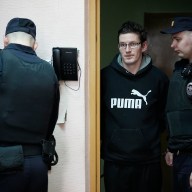HALIFAX, N.S. – Seven years after his brother’s suicide, Ronald Martin described a lawsuit that may compensate victims of alleged abuse by Roman Catholic priests as “the fulfillment” of a promise he made to his sibling.
Martin sat quietly Thursday in the Nova Scotia Supreme Court as Justice David MacAdam heard lawyers explain why a settlement valued at more than $13 million should be certified for the alleged decades-old abuse.
If the deal announced in August is certified, up to 70 people may receive a share of the money from the diocese of Antigonish for abuse that allegedly occurred since Jan. 1, 1950.
Claimants would go before retired justice Walter Goodfellow for adjudication of their claims.
For Martin, that possibility is the completion of a heartrending process that began in 2002, when he viewed his brother David’s dead body and read his suicide note describing the alleged abuse.
“When I found out about the abuse, I said to him (his body), ‘David, I promise you this man will not get away with what happened,’ ” he said outside court.
“At this time I hadn’t known about his abuse, and he hadn’t known about mine. But here I was as a victim saying ‘I would do this for you, David, and for many others.’ “
The suicide note named Hugh Vincent MacDonald, a priest, as the abuser, a revelation that Ronald said, “nearly destroyed” him as it brought painful memories flooding back.
MacDonald was charged with multiple sex-related offences in 2003, but died a year later before the court process concluded.
Lawyer John McKiggan told the court he had gone through a protracted and often tough bargaining process on behalf of the plaintiffs with church lawyers over the diocese’s responsibility.
McKiggan told the judge the parties believed the deal was “just and fair,” and urged him to accept its main terms.
The class-action lawsuit also involves allegations of abuse by four other priests, three of whom have been convicted of multiple counts of sexual assault against children in the care of the diocese. Allegations made in the class action have not been proven in court.
McKiggan said so far, his firm has been retained by 39 claimants and has been contacted by about 50 other people looking for information about the lawsuit.
The lawyer said the process will prevent fraudulent claims by having mutually agreed on “nationally renowned experts” on sexual abuse examine the statements of any would-be claimants.
“From my point of view there is no concern about claims that may be fraudulent,” he said.
Bishop Raymond Lahey of the Antigonish diocese told a news conference last month that the agreement is the first step in recognizing the alleged abuse of children.
At the time, he apologized to “every victim and to their families for the sexual abuse that was inflicted upon those who were instead entitled to the trust and protection of priests.”
Martin, a school teacher, said going through the steps of the lawsuit has been an onerous process that weighed on him emotionally and often put his life on hold.
He said the initial suicide note from his 39-year-old brother “tore open” old wounds of his own abuse.
“As a child I suffered abuse, and on many occasions contemplated suicide myself because it’s something so awful and so deeply rooted that you think there’s no other way to get rid of this,” Martin said.
He said as a teenager he suffered depression, he quit university and his early hopes and ambitions to become a teacher were derailed.
But Martin said he has turned his life around, sought counselling and he hopes the lawsuit will lead to similar healing processes for other claimants.
“I’ve been contacted by dozens of people, and a lot of them will never become part of this case. But they were able to say to me, ‘This happened to me,’ and in saying that they gained a lot of freedom,” he said.
“We’ve journeyed together and it’s like a brotherhood. … I really think this process is a safe place for them to come.”
















